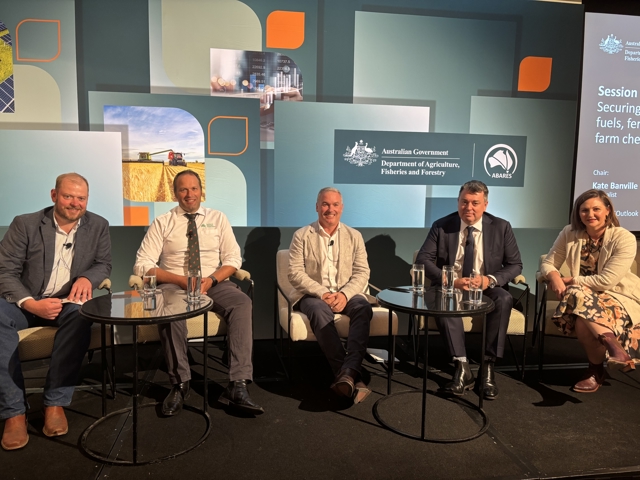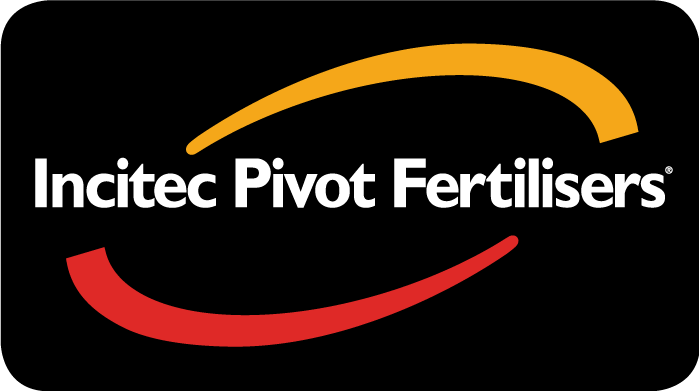ABARES Outlook Conference wrap up
Scott Bowman, Incitec Pivot Fertilisers PresidentMar 13, 2025
From left to right Andrew Henderson, Principal at Agsecure, David Jochinke, President, National Farmers’ Federation, Scott Bowman, President Incitec Pivot Fertilisers, Kate Banville, Journalist.
Last week, I had the pleasure of participating in an industry panel speaking session at the ABARES annual outlook conference. Chaired by journalist Kate Banville, I joined David Jochinke, National Farmers’ Federation President & Scott Hansen, Australian Pesticides and Veterinary Medicines Authority.
How IPF is building resilient supply chains for Australian agriculture
Australia is a significant net exporter of agricultural and food commodities but also a major importer of critical farm inputs needed to ensure our farmers can continue to operate and compete in global markets.
The reality is that most of our manufactured farm inputs, including fertilisers, are part of global supply chains and Australia has operated as part of this global system for decades.
Global supply chains match the product source and least cost supplier with the end user here in Australia.
In the case of fertiliser, that means potash from Canada, urea from low-cost gas jurisdictions and phosphates from those areas with low-cost rock, sulphur and gas.
Australia’s global supply chain isn’t dependent on a single region or producer. Our major competitors supplying into the Australian market are based in the United States, China and Europe.
The Australian market for urea, for example, is supplied from eight separate import source locations.
At Incitec Pivot Fertilisers (IPF), we believe resilient supply chains are essential to Australian agriculture – a view reinforced by the global disruptions and market shifts we have witnessed since Russia’s 2022 invasion of Ukraine.
Australian farmers compete in global markets and we need to be open to and attract global investment.
That's why IPF has invested in an exclusive 20-year agreement with Perdaman for up to 2.3 million tonnes of urea fertiliser annually that will be supplied from Perdaman's facility currently under construction in Karratha, Western Australia.
The facility will be one of the largest and most efficient producers of urea in the world producing in excess of 5,500 tonnes per day. For IPF, this partnership marks a strategic investment in the future of Australian agriculture, guaranteeing a local, high-quality fertiliser supply for Australian growers, reducing reliance on imports and supporting domestic food security.
This project is on track and we are still anticipating our offtake to commence in 2027.
Perdaman is a great example of local and global partnership. It gives us access to urea produced from globally competitively priced WA gas, and we continue to support Australian manufacturing by finding a globally cost competitive solution.
The Karratha facility will be one of the most energy efficient urea plants in the world, using low-emissions technology to produce fertiliser with a reduced carbon footprint.
For our farmers, this means access to a product that supports productivity while also contributing to their sustainability goals.
Agriculture accounts for over half of Australia’s land use and so the sustainable management of this land is important to us all.
The biggest opportunity for us, for our customers and for farmers is to improve productivity while continuing to reinforce Australian agriculture's strong sustainability credentials.
IPF's development of Enhanced Efficiency Fertilisers (EEFs) like eNpower® and Green Urea NV®, present an opportunity for farmers to embrace proven technology to improve nutrient use and maximise yield potential, while helping reduce greenhouse gas (GHG) emissions.
We see our people as the key asset to helping support the Australian agricultural landscape. It’s the work our team does every day that brings to life our vision in inspiring productivity.
IPF continues to invest in research and development, products and our people, to help drive efficiency, sustainability, and innovation in the fertiliser industry, and enhance farmer productivity. We have a long history of supporting Australian farmers and we will continue to deliver the nutrients at the right time to support agricultural productivity.
